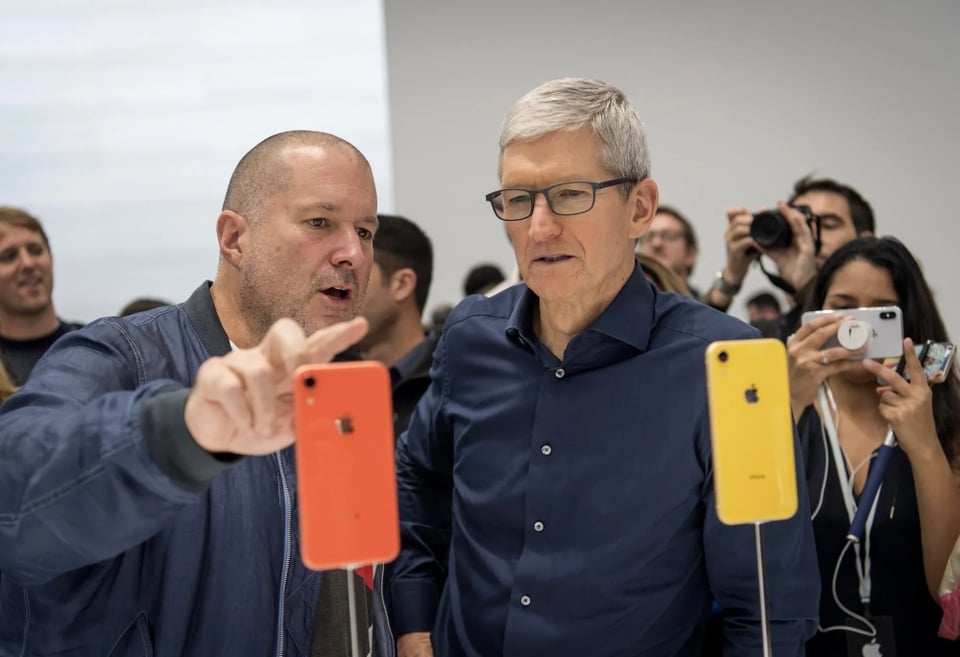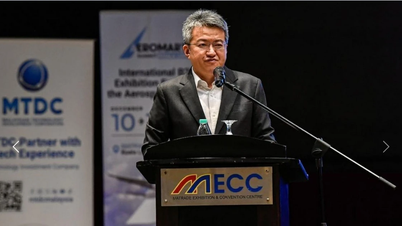 |
Jony Ive (left) and Tim Cook in 2018. Photo: David Paul Morris/Bloomberg . |
As a legendary designer who has been with Apple for nearly three decades, Jony Ive is carrying a pang of guilt because he was the one who contributed to creating the iPhone. This device is the symbol of a generation of products and is the catalyst for the smartphone revolution, the explosion of social networks around the world.
Now, after leaving Apple and founding his own design company, LoveFrom, Ive is collaborating with OpenAI to develop an AI-centric hardware device that, according to Ive, is expected to help him “redeem” society for creating a world too dependent on screens.
In an interview with Stripe CEO Patrick Collison, Ive spoke candidly about the “turbulence” of the modern, smartphone-obsessed world.
He argues that social media is a larger social “illness.” Ive avoids going into specifics about what’s actually wrong with the apps today, beyond the obvious things like radicalizing views and spreading misinformation.
Ive worked at Apple for 27 years and left his position as Chief Design Officer in 2019. His work spans from the first iMac to the iPod and then the iPhone, all of which are closely associated with the Steve Jobs era.
“When you innovate, there are bound to be unintended consequences. But with some of the products that I’ve been very involved in, I think there have been unintended consequences. They’ve been unpleasant consequences. The problem is, even if it wasn’t intended, I think I’m partly responsible. And that weighs on me,” Ive said.
At present, information about LoveFrom and the AI device that Ive is developing is still very vague. He is collaborating with designer Marc Newson and has received support from many famous investors. However, there are still many doubts.
Last year, the market experienced a wave of personal AI devices that had ambitions to replace smartphones. But most of them failed. The most prominent was the Humane Ai Pin. This device allowed access to AI chatbots when connected to the internet, but could barely perform the tasks that traditional smartphones do so well. Eventually, Humane had to sell all of its assets to HP.
Another example is the Rabbit R1, which promised to deliver a cutting-edge AI experience but ended up looking more like a fancy tech toy than a truly useful tool.
“What makes me optimistic about AI is that it's very rare to have a discussion about AI that doesn't involve serious safety concerns,” Ive told Collison.
Doubts about artificial intelligence are indeed growing, both about its societal impact and about whether AI can deliver on all the promises made by big tech companies.
According to Gizmodo , there are signs that the development of AI using current training methods is slowing down. Mainly because of the lack of new data to "feed" the models. However, AI has been and is disrupting many social institutions.
New York Magazine recently reported that many students are using AI chatbots to write essays en masse. Some are even so sophisticated that they intentionally add spelling errors to their papers or use multiple chatbots to bypass teachers' detection systems.
That’s not to mention the more serious copyright implications, or the risk of massive job losses in creative industries like writing, design, journalism, and art. If Ive’s next device simply allows users to interact with another chatbot, that’s not enough.
Source: https://znews.vn/huyen-thoai-apple-cung-khong-the-cuu-chung-ta-khoi-con-nghien-iphone-post1552329.html




![[Photo] Prime Minister Pham Minh Chinh chairs the first meeting of the Central Steering Committee on housing policy and real estate market](https://vphoto.vietnam.vn/thumb/1200x675/vietnam/resource/IMAGE/2025/9/22/c0f42b88c6284975b4bcfcf5b17656e7)






















![[Photo] General Secretary To Lam presents the First Class Labor Medal to the Vietnam National Energy and Industry Group](https://vphoto.vietnam.vn/thumb/1200x675/vietnam/resource/IMAGE/2025/9/21/0ad2d50e1c274a55a3736500c5f262e5)

































































Comment (0)